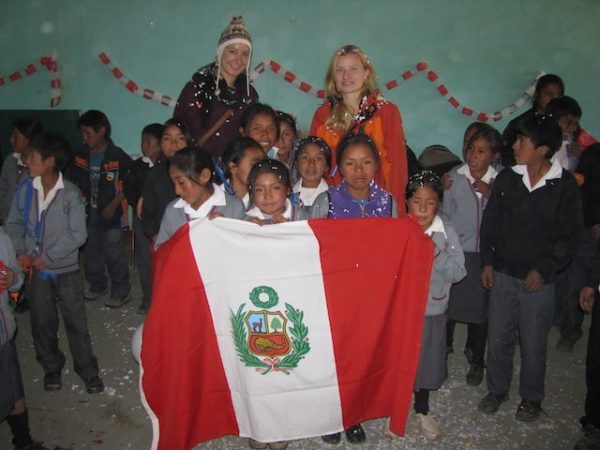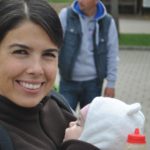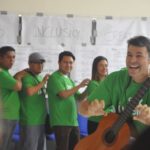Moci, of the Expatclic team, has interviewed Corinna, an Austrian lady who set up a beautiful project in Peru.
 Hello Corinna, it is a pleasure to have you with us. Please tell us a little bit about yourself.
Hello Corinna, it is a pleasure to have you with us. Please tell us a little bit about yourself.
Thanks for having me! When I was younger, traveling and starting over was what kept me inspired and feeling alive.
It all began when I left for a semester to attend school in the US. Around the same time I was deeply touched by a documentary I saw on development aid, which planted a seed in my heart that became my inner voice for travels and projects later on.
For several years, I travelled as a backpacker through many countries in Latin America and lived as an expat in countries like Peru, Costa Rica, Slovenia, Hungary, Switzerland and France.
At one point, I felt the need to reconnect to my roots and decided to spend time in Graz, my hometown. That’s when I met my husband, fell in love, and decided to change the course of my life. I cancelled all my plans for an international career and moved in with my love in Graz. Today I am happily married and a very proud mom of two sweet children – Adrian (3) and Liliana (1). After more than a decade in motion, it is family I enjoy the most at the moment.
Tell us a about your time in Peru and about your project, Aufwind Peru.
It all started with an encounter with a Peruvian expat in Maribor, Slovenia who shared his dream to start teaching English in small villages in the Andes in order to provide local kids with a good knowledge of English – a key for a successful and self-determined future. It would also be a way to keep them living and working in their regions, where tourism could constitute a solid work channel.
I didn’t quite know what I was getting involved in when I told him I would join the project. I had no idea about the place I would stay, the school I was supposed to teach in, or the overall conditions in the country. It was my youthful easygoing nature combined with my eagerness to make adventurous experiences that made me book a flight to Peru.
I was hosted by a family in the Andean village of Paria who lived in a tiny mud house. I arrived during the rainy season, and it was really humid. Everything felt wet. There was no tap water, only a little creek outside the house. No sanitary facilities, only a hole in the barn for pigs. This was probably the time where I pushed myself the furthest out of my personal boundaries and comfort zone. Another problem was that many children at school only spoke Quechua (the indigenous language), which I started to learn immediately. This enabled me to have good contact with the children and people of the village. We were learning Quechua words and English vocabulary reciprocally, so mutuality was one main pillar of the project from the very beginning.
Several weeks later I was informed that the project was cancelled due to lack of funding. I was deeply sorry since we had put a lot of energy into it, everything was going well and most importantly the children were very enthusiastic and ambitious to keep going. So I called my mom in Austria, asked her to set up an association and raise money… and she succeeded! I called the association Aufwind, as the Andean condor needs upwind in order to fly up to 8,000 meters above sea level. I liked the metaphor of Aufwind as a supporting frame. In the end it is the children themselves who have to develop and fly into a self-determined future.
What an amazing story! You really believed in the project. How does it align with your values? Which important skills do you think played a role in the success of the project?
Over the past 60 years, developmental cooperation has been quite a one-dimensional and in many cases neo-colonial undertaking, and therefore an act of false generosity. Things have certainly changed and international partnerships are slowly becoming more equal. However, many people still have go about helping the so-called poor as if the Western countries were the doctors and the rest of the world were their patients.
 I was always very critical of this type of approach and tried to focus on my own learning process. I put mutual learning outcomes first.
I was always very critical of this type of approach and tried to focus on my own learning process. I put mutual learning outcomes first.
Living in Peru in the middle of the Andes made me learn so much about myself, about my cultural boundaries, my attitudes towards life, my well-known comfort zones, and about how I manage to deal with new situations and problems that come up – sometimes quite unexpectedly.
This was also the basis for my PhD research, where I explored reciprocal empowerment in development cooperation as a new viable concept for the 21st century. When we treat each other as equal experts, reciprocal empowerment is a powerful outcome and definitely a win-win situation.
I had a strong will to contribute to a better, more peaceful world, followed by the courage to not only talk about (global) problems, but to actually take action. I am a doer, not just a thinker. I like challenges and the process of figuring out a solution in order to reach my targets. I think some kind of entrepreneurial mind combined with good self-reflection, empathy and overall goodwill are quite helpful. Finally, I try to practice humility on a daily basis. These skills and attitudes were probably contributing factors in a good project start.
Having good leadership on both sides – the Peruvian as well as the Austrian – is a different story and quite a challenge considering the huge distance between the countries. We have also experienced hard times related to issues of confidence, fundraising, and interaction between team members.
In the end, after more than 11 years of experience, we have managed to keep going, to learn from our mistakes, and to set up a stable association. All of this is only manageable thanks to a great team here in Austria as well as in Peru: people who definitely want to make a difference and who put a lot of energy and free time into a project like Aufwind. I am very grateful to everyone who has spent some time with us now or in the past.
What would you tell expats all over the world about their (potential) role in using their skills in making a better world? How would you inspire them?
I would tell them to DANCE ☺
The world is becoming more interdependent. Humans are facing common challenges all over the planet. I suggest we use the metaphor of a dance, like the tango. When dancing, both partners need to give a good performance. They need each other in order to reach their goal. Certainly, there exist asymmetries between the two, but dancing together is a wonderful way of dealing with them in a respectful way. Dancing is changing the direction, it’s anticipating the next step and move of the other, it is empathically giving signs and reacting to the other’s signs. Dancing is RECIPROCAL EMPOWERMENT!
 Previous Post
Previous Post Next Post
Next Post